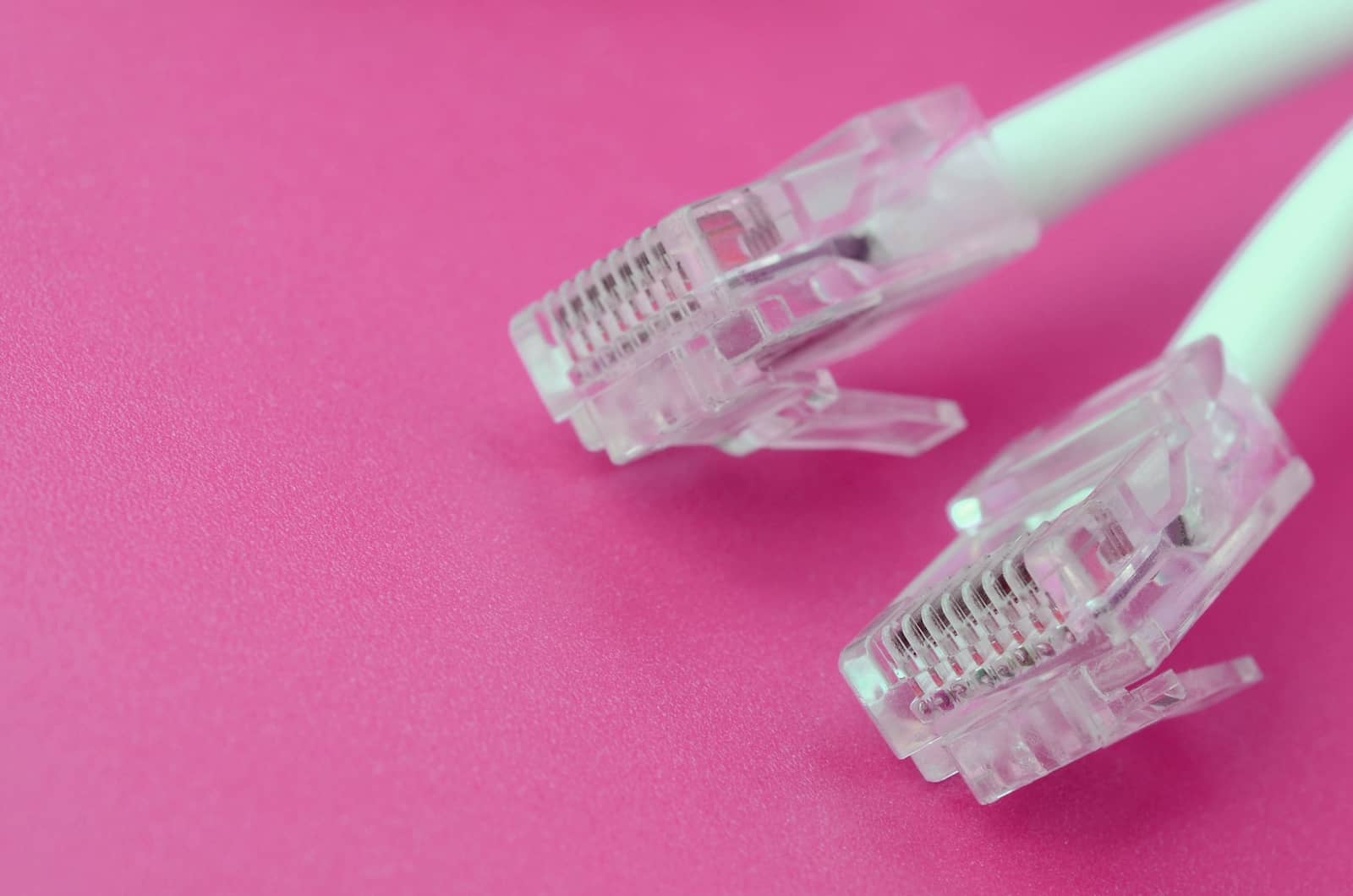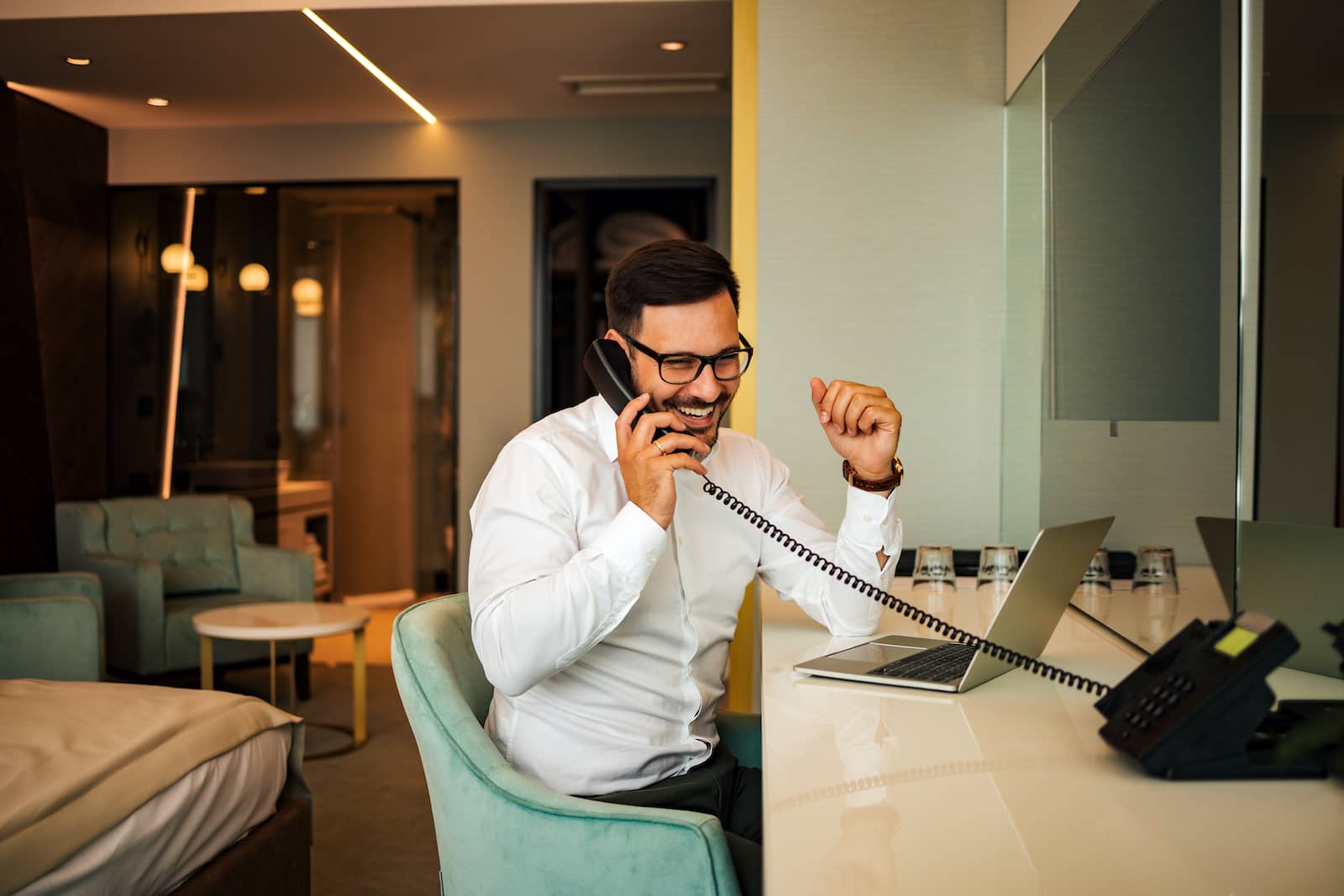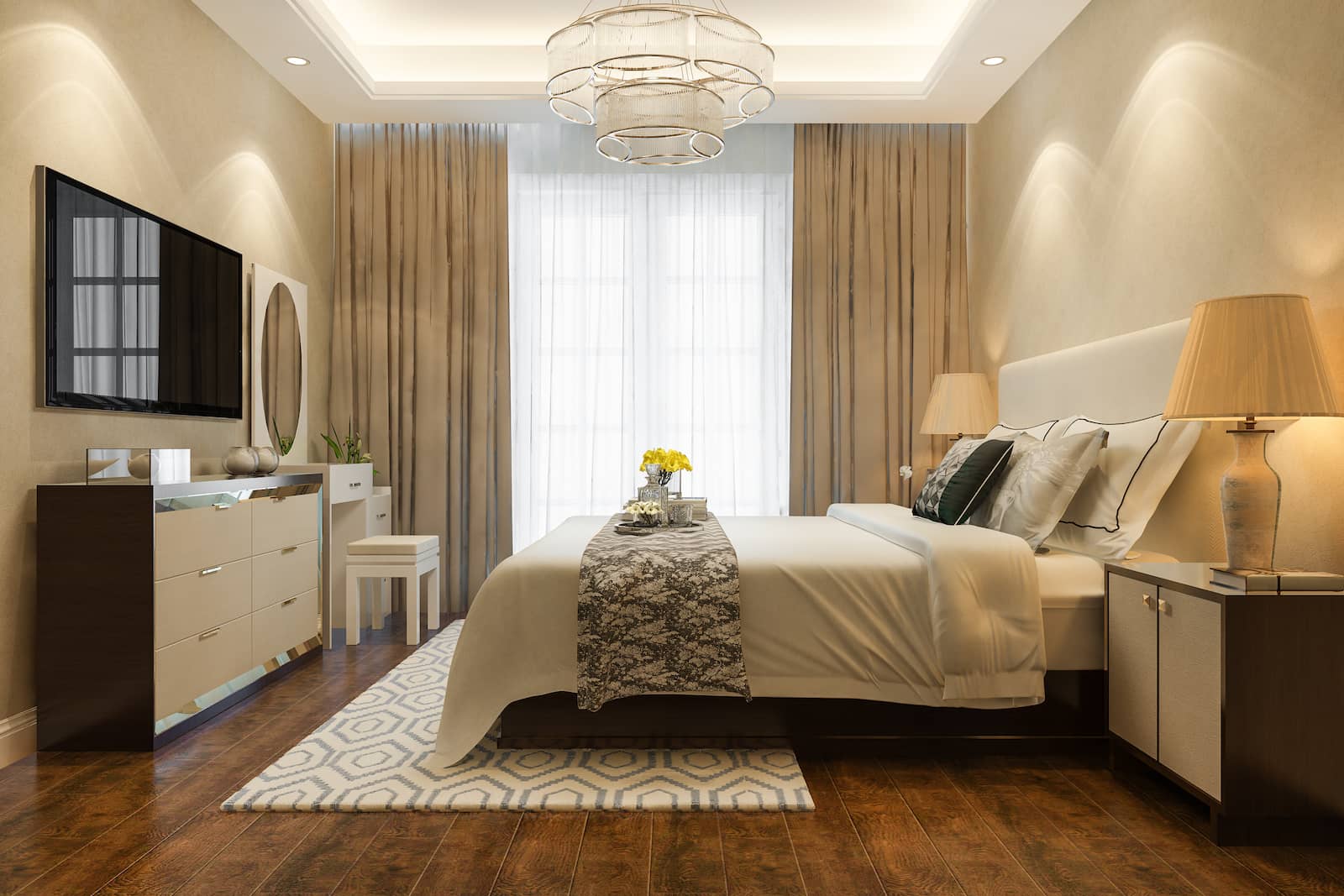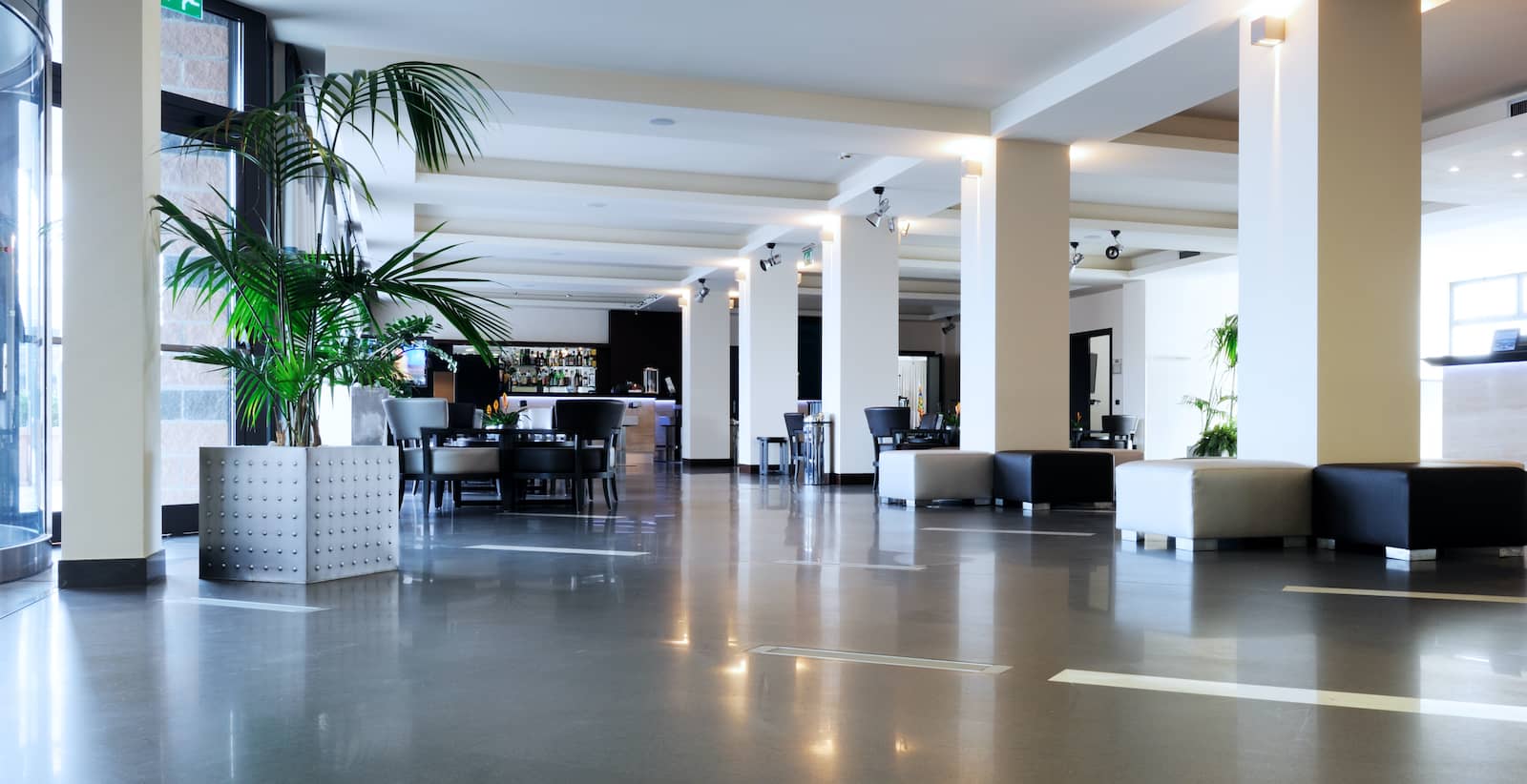PoE Solutions in Hospitality
When guests enter a hotel lobby, a wedding venue, or a five-star restaurant, the first thing they’ll probably notice is the decor. The smells. The sounds. Guests will immediately assess whether the space is too hot or cold. This first impression will likely set the tone for the entire guest experience.
As anyone in the hospitality industry knows, delivering an exceptional experience can be expensive. The costs of opening a restaurant average between $3,000 to $4,000 a seat.1 Continuous improvements to the building, furnishings, and equipment will be needed. Ongoing costs, such as utilities, can be as high as $2,500 per month. Finding ways to keep operating costs down is crucial.
Power over Ethernet (PoE) hospitality solutions can help the industry rein in costs without sacrificing customer satisfaction. PoE enhances hospitality technology by providing efficient power delivery and enabling streamlined connectivity. It enables hospitality establishments to provide their guests with a one-of-a-kind experience.

What is PoE?
PoE allows for the transmission of both electrical current and data across Cat5e, Cat6 or Cat6A network cables to PoE-capable devices. Not only does this technology eliminate the need for separate power cords and ethernet cables, it also increases the flexibility of device placement.
For example, placing surveillance cameras in hospitality facilities can be costly if wires have to be run to each device. Connecting them through Ethernet cables reduces installation costs and allows cameras to be placed in locations where electrical current isn’t available. With an IP-based security system, equipment can be deployed for maximum coverage and improved safety.

How Does PoE Work?
PoE technology sends power and data over a single twisted-pair Ethernet cable to PoE end devices, including access points, IP cameras, VoIP phones, and many other smart devices.
Originally, only devices requiring 30 watts or less of power could work with PoE technology. Today’s PoE devices can deliver between 90 and 100 watts. The increased power delivery enables the technology to support a wider range of devices, such as digital signage and displays. As more Internet of Things (IoT) devices are deployed, the need for cost-effective PoE solutions in the hospitality industry will only increase.

Why Use PoE?
PoE technology eliminates the need for running two cables when installing a network-connected device. It makes installation easier and reduces infrastructure costs. It provides a more efficient method of delivering power.
Enhanced Connectivity
Creating a PoE-enabled infrastructure improves power and data distribution. Both services can flow over the same cable, making it possible to send and receive data from diverse locations. PoE allows for a more agile infrastructure as it can scale quickly and reconfigure without costly electrical changes. Power outages do not mean everything shuts down. With minimal power requirements (sent to one switch instead of multiple locations on the property), infrastructure can more easily operate on backup power.
Efficient Power Delivery
Older venues, hotels, or restaurants usually come with power problems. There’s not enough. Twenty years ago, hotel guests didn’t arrive with cell phones, laptops, electric toothbrushes, and portable coffee makers. The electrical equipment that a five-star restaurant uses goes far beyond a single grill, dishwasher, and cooler. Ensuring that the power infrastructure is as cost-effective as possible will help reduce those $2,500 per month energy bills.
Leveraging the true flexibility of energy-efficient devices means installing more sensors for better temperature control. Smart technology can be individualized down to the room, so lights are switched off and thermostats adjusted automatically when someone enters or leaves the room. PoE technology provides a more environmentally-friendly solution for increased sustainability.

How Can PoE Help the Hospitality Industry Use Technology?
A 2023 study found that hoteliers are looking to add mobility technology for check-in, check-out, and room access. Adding smart TVs with two-way messaging is a technology that 95% of hotels are considering. These technologies require reliable and high-quality internet.
Poor internet quality will not only be an issue for the guests. It becomes an issue for employees when the promised amenities do not work. People often travel with multiple devices and demand bandwidth for streaming content. That requires better access, higher bandwidth, and increased speed.
For many in the hospitality sector, upgrading their infrastructure is crucial to delivering the customized services guests have come to expect. A 2020 survey found that 77.6% of hotels expect to increase their technology investments in the next three years. They are looking to deploy technology in back office operations to improve efficiencies and in all of their guest-facing functions, all to achieve a competitive level of customer service. With PoE, the hospitality industry can optimize its technology investment.
Let’s look at three examples of how PoE solutions might help a business in the hospitality industry.
Smart Hotel Rooms
When hoteliers decide to renovate, restore, or repurpose existing buildings, they’ll want to preserve as much of the original character of that building as possible. PoE technology helps reduce the disruptive nature of architectural upgrades. Installers can place cables and devices in more discrete locations without needing to disturb the walls by adding an electrical outlet or power source.
With that flexibility, staff and guests can enjoy a seamless experience. Management can control lighting and temperature in shared spaces remotely. They can set schedules so adjustments happen automatically. Guests can request valet parking before arrival to minimize delays at check-in.
The Sinclair Building in downtown Fort Worth was recently restored to its 1929 glory. While maintaining its Art Deco origins, the property has still manage to incorporate some of the latest hospitality technology.
Guests can use their voices to turn on mirrors and customize their showers. Imagine having the water pressure increase at the sound of your voice or the water turn from spray to massage. PoE technology allows individualized temperature control in each room, allowing guests to find their perfect setting.
Displays and Signage
Digital displays and signage serve multiple purposes within the hospitality industry. Signs can provide directions as guests wander the halls of large cruise ships. Even in small venues, signs are important to help guests navigate an unfamiliar space.
Promoting upcoming events through LCD displays can keep guests informed of upcoming resort activities. With PoE technologies, displays can be placed where they will attract the most attention rather than on a wall with an outlet. Adding interactive capabilities is a 2023 trend in hospitality.
Displays aren’t just for guests. They can also be used to streamline operational processes. Commercial kitchens are places of controlled chaos during peak times. Keeping workspaces free of cables and wires is a must. Despite this, many commercial kitchens are plagued with order displays that require access to electrical outlets, which are often in short supply.
LCD displays powered by PoE technology allow kitchen staff to place screens where they use them without competing with kitchen equipment for valuable workspace. Eliminating any unnecessary wires and cords will reduce the chance of an accident and streamline the workflow. Placing PoE-powered environmentally controlled sensors in coolers and freezers can ensure proper temperatures are always maintained.
Another 2023 trend is to incorporate augmented and virtual reality into the guest experience. In-lobby screens can let guests take a virtual tour of a large resort property, a cruise ship, or an amusement park. The virtual experience makes the tour come alive and helps orient individuals to the space. No one wants to get lost on their way to dinner.
Lighting
PoE-powered lighting can change a venue or property from great to exceptional. Take Hyatt’s latest Alila Hotel. This luxury resort is located in the San Diego area and boasts spectacular views of the Pacific Ocean. Part of the elevated feel of the property comes from its PoE-powered lighting,
Lighting systems are smart. Light fixtures now come with internet connectivity, as do low-wattage sensors, making it possible to connect using standard Ethernet cables and PoE ports. They have this flexibility because wires do not have to be rerouted and voltages do not need to be changed. With PoE, you simply change the port and extend a cable.
With a PoE platform such as Igor’s Nexos, the management of PoE devices can include sensors, access controls, and window shading. All devices can be managed from a single application, giving staff greater control of the guest experience. Smart rooms allow guests to control their own lights, thermostats, and doors.
Sustainability
PoE solutions are part of the hospitality industry’s big push to create sustainable venues, hotels, amusement parks, and restaurants. The Hotel Marcel in New Haven, Connecticut, is one of the first net-zero hotels. Once the headquarters for Armstrong Rubber, the Hotel has been turned into a luxury experience and is located near Yale University.
The hotel uses a massive solar array to operate its electrical systems. The building’s large windows have been replaced with high-performance glazed glass to reduce energy loss and noise pollution from outside traffic. Guests have control of their room’s lights, thermostats, and window shades. They can choose between sheer or black-out curtains. These PoE-compatible controls, sensors, and devices allow guests to create the perfect atmosphere for work or sleep.

The Value of PoE Solutions for the Hospitality Industry
Because of its flexibility and ease of installation, PoE solutions are allowing the hospitality sector to pivot quickly and address the changing trends of the industry. These hardware devices, when coupled with software systems, provide management with centralized control over operations. Using a single interface, staff can adjust thermostats, turn off lights, and raise or lower shades based on information from multiple PoE-powered IoT devices. The technology also reduces the industry’s energy consumption and adds to the facility’s overall sustainability.
However, PoE is not without challenges. Incorporating this technology into a building’s infrastructure requires network design and certain power/capacity requirements. Network security must be robust to protect against possible attacks. Management systems will be required as more devices are deployed. As you look to the future, you can rely on Versa Technology for high-powered PoE equipment.
Frequently Asked Questions About PoE Solutions in Hospitality
1. What is Power over Ethernet (PoE)?
PoE is a technology that allows electrical current and data to travel through an Ethernet cable simultaneously without signal interference.
2. What are the advantages of using PoE in hospitality technology?
PoE technology offers the following advantages:
- Ease of Installation: Separate power sources are not required, simplifying installation and lowering costs.
- Cost savings: PoE technology uses one cable to carry both data and power, eliminating the need for a second set of wires.
- Safety: PoE can stop current flows during a disruption.
- Speed: The technology can support speeds of up to 5 Gbps if the IEEE 802.3bz standard is used.
- Security: PoE devices connected to well-secured networks enjoy the same level of security as other devices.
3. What devices can be powered by PoE?
PoE technology can support many types of devices, including the following:
- IP telephones.
- Robotic cameras.
- Video surveillance systems.
- High-performance wireless access points.
- LED lighting.
- LCD displays and TVs.
- Access systems.
- Digital signage displays.
- Intercoms.
- Sensors.
4. How does PoE benefit wireless networks?
PoE wireless access points can be placed where needed rather than where there is power. They can be positioned to provide the maximum coverage possible while meeting the high-performance demands of guests.
5. Are all network switches and devices PoE compatible?
Not every network device is PoE compatible, but there are PoE components that will extract the electrical current from the Ethernet cable. This enables non-compliant devices to still operate in a PoE-based environment.
6. Can PoE be used for IP phones and communication systems in hospitality?
Yes, most IP phone systems are PoE-enabled. When an electric current is received through an Ethernet port, the phone powers on.
7. Is PoE technology secure for hospitality networks?
Any device connected to a network receives the same security protection as the rest of the network-connected devices. PoE protocol requires that the transmitting device issue a handshake request to the receiving device. If the receiving device does not respond, no power is sent. This protects against unauthorized attempts to access the network.
8. Can PoE be retrofitted into existing hospitality infrastructure?
There are many converters and adaptors that can be used to turn a non-compliant device into a compliant one. This adaptability makes it easier for companies trying to upgrade existing infrastructures rather than replace them.
9. How does PoE contribute to guest experience and satisfaction?
PoE technology supports in-room devices that can create a better customer experience. Among these are:
- Voice-activated mirrors and showers.
- Mobile entry devices on room doors.
- Individualized temperature controls.
- Touchscreens for check-in and check-out.
10. What does the future hold for PoE technology in the hospitality industry?
PoE combined with IoT will continue to change the shape of the hospitality industry. As the pressure to find more sustainable solutions increases, PoE will help the hospitality sector meet its environmental goals.
